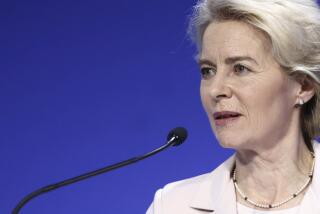Greece gets another bailout from Eurozone
- Share via
Reporting from London — Leaders of the beleaguered Eurozone announced a massive new financial bailout package for Greece on Thursday, doubling the amount of loans already on offer to Athens to help keep it afloat and incorporating voluntary contributions from private investors.
The 17 countries that use the euro currency also agreed to broaden the resources available to other troubled economies and banks in the region in an effort to beat back a debt crisis that has threatened to spread from Greece, Ireland and Portugal to much larger economies such as Italy and Spain.
At an emergency summit in Brussels, Eurozone leaders agreed to offer $157 billion in loans to help Greece pay its bills, on top of a nearly identical loan package last year.
But to make it easier for Athens to repay its debts, the interest rate is to be lowered to 3.5%, and loans that were to come due after 7½ years will now do so after 15 years and even, in some cases, up to 40 years.
In perhaps the most closely watched element of the new rescue plan, private bondholders, such as banks and mutual funds, are expected to contribute $53 billion by, for example, rolling over Greek debt on a voluntary basis and accepting lower yields. Depending on how many private investors join in, that amount could go as high as $78 billion in three years, said the Institute of International Finance, a private banking association.
However, even such voluntary measures by the private sector could still be viewed as losses by ratings agencies, which have warned that they might then declare Athens to be at least temporarily in partial default. That would make Greece the first developed European country to slide into default in about 60 years, a situation whose ripple effects remain to be seen.
All eyes will be on the markets Friday to see how they react to the new rescue package, which was hammered out at a hastily convened summit that many analysts characterized as a make-or-break session for the Eurozone in its attempt to rein in its galloping debt crisis.
Worry about Eurozone inaction over Greece’s economic woes has caused investors to doubt their holdings of debt belonging to Italy and Spain, driving up those countries’ borrowing costs to almost intolerable levels.
Europe’s leaders were starkly warned to act quickly to stem the contagion or risk an implosion of the Eurozone and the single currency, which would have enormous global repercussions. President Obama, dealing with his own debt crisis in the U.S., urged Europe to move quickly.
“This threat had to be contained,” Herman van Rompuy, president of the European Union, said Thursday night. “We have shown that we will not waver in the defense of our monetary union and our common currency.... When European leaders say we will do everything [that] is required to save the Eurozone, it is very simple. We mean it.”
To help debt-ridden governments such as Rome and Madrid if they run into trouble in the markets, the Eurozone leaders agreed to grant new powers to their $634-billion bailout fund, allowing it to preemptively issue temporary lines of credit.
The fund will also be authorized to shore up sickly banks when necessary, which could be crucial for Greek financial institutions if the ratings agencies declare Athens to be in partial default.
Greek Prime Minister George Papandreou said the new rescue package would help lighten the burden on his country. But he said that the new initiative was important for the region as a whole.
“This is a European success, a European package,” he said. “It’s a European response for Europe.”
For months, the region’s capitals have argued over how best to help Greece out of its financial hole. In particular they debated over whether private investors who bought Greek bonds should be forced to take a loss to help alleviate Athens’ massive debt burden, which is equal to about 1½ times the country’s entire annual economic output.
German Chancellor Angela Merkel has pushed the hardest for private-sector involvement, partly to appease voters back home who are angry at having to use their tax money to rescue another country and partly to uphold the idea that those who gamble on the markets should be prepared to lose as well as gain.
But the French government disagreed on how private bondholders would participate, and the European Central Bank openly disparaged Berlin’s plan, saying that it would put Greece in partial default.
The public bickering has only served to spook the markets, whose increasing doubts over Italy and Spain dramatically raised the stakes for Thursday’s summit.
In the last few days, the European Central Bank signaled that it was now willing to countenance a partial default for Greece. A last-minute meeting Wednesday between Merkel and French President Nicolas Sarkozy resulted in the deal that was approved in Brussels on Thursday.
More to Read
Sign up for Essential California
The most important California stories and recommendations in your inbox every morning.
You may occasionally receive promotional content from the Los Angeles Times.














